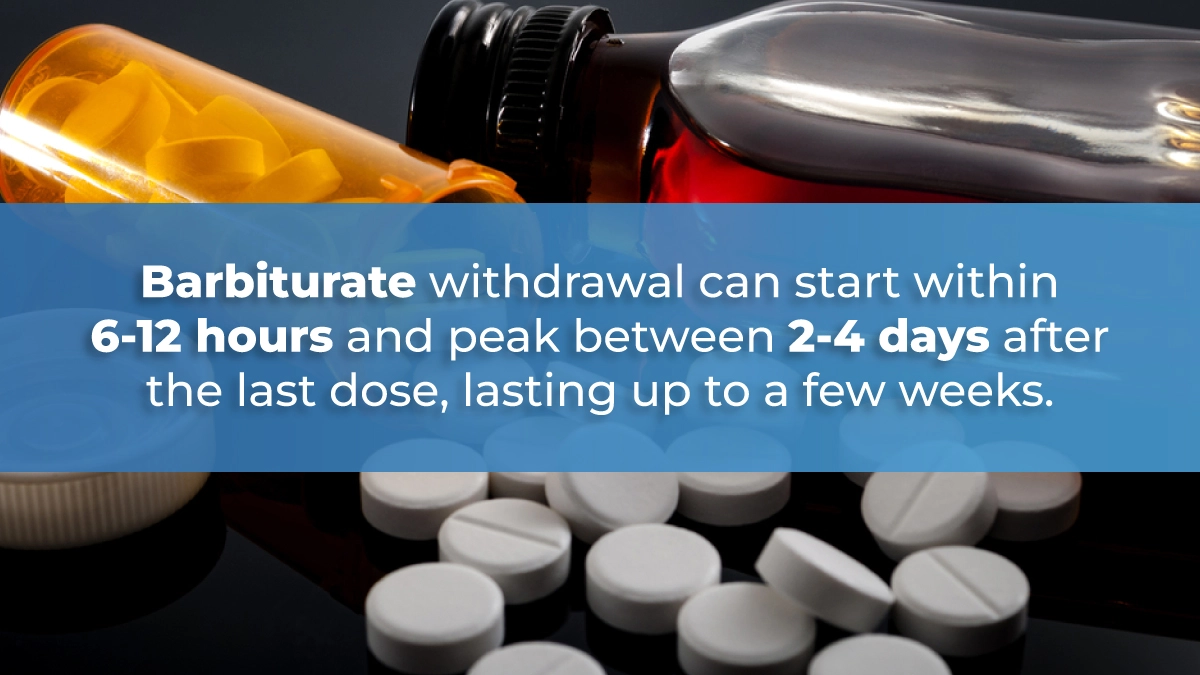Barbiturate Withdrawal: Understanding the Process
Barbiturates are medications that can help with anxiety, seizures, and sleep disorders. When someone uses these drugs for a while, their body can become dependent on them. Barbiturate withdrawal happens when someone suddenly stops taking these medications after long-term use.
This article will examine the barbiturate withdrawal process, detailing the symptoms and complications people might face when they stop taking these drugs. In addition, it will discuss various treatment options available to help manage and ease these withdrawal symptoms.
Key Takeaways
Barbiturates are sedative-hypnotics that can lead to addiction and withdrawal issues. Here is what you need to know:
- Barbiturate withdrawal can start within 6-12 hours and peak between 2-4 days after the last dose, lasting up to a few weeks.
- Barbiturate withdrawal symptoms can range from anxiety and insomnia to severe complications like seizures and hallucinations.
- Treatment involves medical detox, therapy, and support to manage symptoms and prevent complications.
Contact The Recovery Team today at (800) 817-1247 for personalized, evidence-based support to overcome any substance use disorder (SUD).
What are Barbiturates?
Barbiturates are a class of drugs that act as central nervous system depressants. Once widely used for their sedative, hypnotic, and anesthetic properties, barbiturates enhance the activity of a neurotransmitter called gamma-aminobutyric acid (GABA), which inhibits brain activity, resulting in calming or sedative effects.
When used regularly over an extended period, the body can develop a tolerance to barbiturates. Tolerance means that higher doses are needed to achieve the same effect, leading some individuals to increase their dosage, which can be dangerous due to the potential for overdose.
Withdrawal from barbiturates occurs when someone who has been using them regularly suddenly stops or significantly reduces their dosage. Barbiturate withdrawal can be severe and potentially life-threatening due to the body’s dependence on the drug. The severity of withdrawal symptoms depends on factors such as the duration of use, the dosage, and the individual’s overall health.
The withdrawal process can be complex and challenging due to the potential for severe symptoms. Medical supervision and support are often necessary to safely manage withdrawal from barbiturates, typically involving a gradual tapering of the drug to minimize the intensity of symptoms of withdrawal and prevent complications.
Navigating Barbiturate Withdrawal: Process and Timeline
Barbiturate withdrawal is a complex process that involves several stages and can vary in duration and intensity from person to person. Let’s have a look:
Onset of Withdrawal
Barbiturate withdrawal typically begins when an individual abruptly stops or significantly reduces their intake of these medications. The onset can vary based on factors such as the specific barbiturate used, dosage, and duration of use.
In most cases, withdrawal symptoms start to surface within 6 to 12 hours after the last dose. It’s during this initial phase that individuals may experience heightened anxiety, restlessness, and difficulty sleeping. These early signs signal the body’s adjustment to the absence of barbiturates, and seeking professional guidance is crucial to managing emerging symptoms.
Phases of Withdrawal
Barbiturate withdrawal unfolds in distinct phases, each presenting unique challenges. The acute phase, occurring in the first week, is characterized by the most intense symptoms, like insomnia, tremors, and increased heart rate. Following this, the subacute phase spans weeks two to four, where symptoms gradually diminish but may still be present.
The protracted phase, extending beyond a month, involves lingering symptoms that require ongoing monitoring and support. Throughout these phases, individuals may grapple with emotional and physical challenges, making it vital to have a comprehensive support system.
Duration of Withdrawal
The duration of barbiturate withdrawal varies among individuals and is influenced by factors like the specific barbiturate used and the length of dependence. Generally, acute withdrawal symptoms peak within the first few days and start subsiding within a week.
However, the subacute phase may persist for several weeks, with some symptoms lingering into the protracted phase. Recognizing that withdrawal is a gradual process and understanding that support is crucial throughout this period is essential for those navigating the challenges of discontinuing the use of barbiturates.
Symptoms of Barbiturate Withdrawal
Barbiturates, when discontinued abruptly after prolonged use, can lead to withdrawal symptoms. These symptoms can range from mild to severe and may include:
Physical Symptoms
Withdrawal from barbiturates can manifest in various physical ways, including:
- Nausea and vomiting
- Sweating
- Tremors
- Insomnia
- Increased heart rate
- Hypertension
- Muscle Pain
- Seizures
- Hallucinations
Psychological Symptoms
Barbiturate withdrawal not only affects the body but also the mind, leading to psychological manifestations such as:
- Anxiety
- Depression
- Irritability
- Mood swings
- Confusion
- Paranoia
- Delirium
- Memory impairment
- Suicidal thoughts or actions
Individuals experiencing barbiturate withdrawal should seek professional medical assistance, as the severity of symptoms can vary, and medical supervision is essential to ensure a safe and supportive withdrawal process.
Risks and Dangers: Barbiturate Withdrawal Complications
Barbiturate withdrawal, if not appropriately managed, can lead to several complications that pose significant risks to an individual’s health. Let’s explore:
Danger of Unmonitored Withdrawal
Unmonitored withdrawal from barbiturates can trigger severe complications. Seizures, in particular, are a significant concern during the acute phase of withdrawal, posing a high risk of injury or even life-threatening situations.
Respiratory distress, marked by breathing difficulties, and cardiovascular complications such as irregular heartbeats or fluctuations in blood pressure can also arise, necessitating immediate medical attention.
Risk of Post-Acute Withdrawal Syndrome (PAWS)
Post-acute withdrawal syndrome (PAWS) is a condition where individuals experience prolonged withdrawal symptoms even after the acute phase has passed. These symptoms can persist for months and include anxiety, depression, sleep disturbances, and cognitive difficulties.
PAWS can significantly impact an individual’s ability to function and maintain sobriety, highlighting the need for ongoing support and monitoring during the post-acute phase of withdrawal.
Managing Barbiturate Withdrawal: Effective Treatments
Various methods and strategies are available that can help individuals navigate the challenging phase of barbiturate withdrawal and lead a healthier lifestyle.
Medical Detox Program
Medical detox, often conducted in a specialized detox center under medical care, involves gradually tapering off barbiturate use while managing withdrawal symptoms. The detox process helps alleviate the discomfort of withdrawal and reduces the risk of severe complications like seizures or respiratory distress.
Rehab Programs
Rehab programs play a pivotal role in long-term recovery. Inpatient care and outpatient rehab options provide structured environments where individuals can receive therapeutic interventions, support, and education. These programs focus on addressing the underlying factors contributing to barbiturate misuse and developing coping strategies for a drug-free life.
Medications
Certain prescription medications can be used during withdrawal to ease symptoms and reduce cravings. Medical professionals prescribe and monitor these medications to ensure safe and effective use. Common medications may include anti-anxiety medications, anticonvulsants, and others tailored to individual needs.
Counseling and Therapies
Counseling and various therapies, such as cognitive behavioral therapy (CBT) or group therapy, play crucial roles in addressing the psychological aspects of barbiturate dependence. These approaches help individuals understand triggers, develop coping strategies, and build a strong support network.
Lifestyle Changes
Adopting healthy lifestyle changes is fundamental to sustained recovery. This involves establishing routines, engaging in positive activities, and making choices that promote overall well-being. Emphasizing physical and mental health contributes to a more resilient and fulfilling life after withdrawal.
Barbiturate Withdrawal: Understanding the Process
Barbiturates are medications that can help with anxiety, seizures, and sleep disorders. When someone uses these drugs for a while, their body can become dependent on them. Barbiturate withdrawal happens when someone suddenly stops taking these medications after long-term use.
This article will examine the barbiturate withdrawal process, detailing the symptoms and complications people might face when they stop taking these drugs. In addition, it will discuss various treatment options available to help manage and ease these withdrawal symptoms.
Key Takeaways
Barbiturates are sedative-hypnotics that can lead to addiction and withdrawal issues. Here is what you need to know:
- Barbiturate withdrawal can start within 6-12 hours and peak between 2-4 days after the last dose, lasting up to a few weeks.
- Barbiturate withdrawal symptoms can range from anxiety and insomnia to severe complications like seizures and hallucinations.
- Treatment involves medical detox, therapy, and support to manage symptoms and prevent complications.
Contact The Recovery Team today at (800) 817-1247 for personalized, evidence-based support to overcome any substance use disorder (SUD).
What are Barbiturates?
Barbiturates are a class of drugs that act as central nervous system depressants. Once widely used for their sedative, hypnotic, and anesthetic properties, barbiturates enhance the activity of a neurotransmitter called gamma-aminobutyric acid (GABA), which inhibits brain activity, resulting in calming or sedative effects.
When used regularly over an extended period, the body can develop a tolerance to barbiturates. Tolerance means that higher doses are needed to achieve the same effect, leading some individuals to increase their dosage, which can be dangerous due to the potential for overdose.
Withdrawal from barbiturates occurs when someone who has been using them regularly suddenly stops or significantly reduces their dosage. Barbiturate withdrawal can be severe and potentially life-threatening due to the body’s dependence on the drug. The severity of withdrawal symptoms depends on factors such as the duration of use, the dosage, and the individual’s overall health.
The withdrawal process can be complex and challenging due to the potential for severe symptoms. Medical supervision and support are often necessary to safely manage withdrawal from barbiturates, typically involving a gradual tapering of the drug to minimize the intensity of symptoms of withdrawal and prevent complications.
Navigating Barbiturate Withdrawal: Process and Timeline
Barbiturate withdrawal is a complex process that involves several stages and can vary in duration and intensity from person to person. Let’s have a look:
Onset of Withdrawal
Barbiturate withdrawal typically begins when an individual abruptly stops or significantly reduces their intake of these medications. The onset can vary based on factors such as the specific barbiturate used, dosage, and duration of use.
In most cases, withdrawal symptoms start to surface within 6 to 12 hours after the last dose. It’s during this initial phase that individuals may experience heightened anxiety, restlessness, and difficulty sleeping. These early signs signal the body’s adjustment to the absence of barbiturates, and seeking professional guidance is crucial to managing emerging symptoms.
Phases of Withdrawal
Barbiturate withdrawal unfolds in distinct phases, each presenting unique challenges. The acute phase, occurring in the first week, is characterized by the most intense symptoms, like insomnia, tremors, and increased heart rate. Following this, the subacute phase spans weeks two to four, where symptoms gradually diminish but may still be present.
The protracted phase, extending beyond a month, involves lingering symptoms that require ongoing monitoring and support. Throughout these phases, individuals may grapple with emotional and physical challenges, making it vital to have a comprehensive support system.
Duration of Withdrawal
The duration of barbiturate withdrawal varies among individuals and is influenced by factors like the specific barbiturate used and the length of dependence. Generally, acute withdrawal symptoms peak within the first few days and start subsiding within a week.
However, the subacute phase may persist for several weeks, with some symptoms lingering into the protracted phase. Recognizing that withdrawal is a gradual process and understanding that support is crucial throughout this period is essential for those navigating the challenges of discontinuing the use of barbiturates.
Symptoms of Barbiturate Withdrawal
Barbiturates, when discontinued abruptly after prolonged use, can lead to withdrawal symptoms. These symptoms can range from mild to severe and may include:
Physical Symptoms
Withdrawal from barbiturates can manifest in various physical ways, including:
- Nausea and vomiting
- Sweating
- Tremors
- Insomnia
- Increased heart rate
- Hypertension
- Muscle Pain
- Seizures
- Hallucinations
Psychological Symptoms
Barbiturate withdrawal not only affects the body but also the mind, leading to psychological manifestations such as:
- Anxiety
- Depression
- Irritability
- Mood swings
- Confusion
- Paranoia
- Delirium
- Memory impairment
- Suicidal thoughts or actions
Individuals experiencing barbiturate withdrawal should seek professional medical assistance, as the severity of symptoms can vary, and medical supervision is essential to ensure a safe and supportive withdrawal process.
Risks and Dangers: Barbiturate Withdrawal Complications
Barbiturate withdrawal, if not appropriately managed, can lead to several complications that pose significant risks to an individual’s health. Let’s explore:
Danger of Unmonitored Withdrawal
Unmonitored withdrawal from barbiturates can trigger severe complications. Seizures, in particular, are a significant concern during the acute phase of withdrawal, posing a high risk of injury or even life-threatening situations.
Respiratory distress, marked by breathing difficulties, and cardiovascular complications such as irregular heartbeats or fluctuations in blood pressure can also arise, necessitating immediate medical attention.
Risk of Post-Acute Withdrawal Syndrome (PAWS)
Post-acute withdrawal syndrome (PAWS) is a condition where individuals experience prolonged withdrawal symptoms even after the acute phase has passed. These symptoms can persist for months and include anxiety, depression, sleep disturbances, and cognitive difficulties.
PAWS can significantly impact an individual’s ability to function and maintain sobriety, highlighting the need for ongoing support and monitoring during the post-acute phase of withdrawal.
Managing Barbiturate Withdrawal: Effective Treatments
Various methods and strategies are available that can help individuals navigate the challenging phase of barbiturate withdrawal and lead a healthier lifestyle.
Medical Detox Program
Medical detox, often conducted in a specialized detox center under medical care, involves gradually tapering off barbiturate use while managing withdrawal symptoms. The detox process helps alleviate the discomfort of withdrawal and reduces the risk of severe complications like seizures or respiratory distress.
Rehab Programs
Rehab programs play a pivotal role in long-term recovery. Inpatient care and outpatient rehab options provide structured environments where individuals can receive therapeutic interventions, support, and education. These programs focus on addressing the underlying factors contributing to barbiturate misuse and developing coping strategies for a drug-free life.
Medications
Certain prescription medications can be used during withdrawal to ease symptoms and reduce cravings. Medical professionals prescribe and monitor these medications to ensure safe and effective use. Common medications may include anti-anxiety medications, anticonvulsants, and others tailored to individual needs.
Counseling and Therapies
Counseling and various therapies, such as cognitive behavioral therapy (CBT) or group therapy, play crucial roles in addressing the psychological aspects of barbiturate dependence. These approaches help individuals understand triggers, develop coping strategies, and build a strong support network.
Lifestyle Changes
Adopting healthy lifestyle changes is fundamental to sustained recovery. This involves establishing routines, engaging in positive activities, and making choices that promote overall well-being. Emphasizing physical and mental health contributes to a more resilient and fulfilling life after withdrawal.
The Recovery Team: Building Bridges to Renewal
Break free from the chains of barbiturate addiction with The Recovery Team by your side. Our comprehensive addiction treatment services are tailored to your needs, offering both residential care and outpatient programs, depending on the severity of your substance abuse.
Our programs are built on evidence-based therapies like cognitive behavioral therapy (CBT), medication management, recreational activities, and family involvement. Every step is about empowering you toward lasting recovery.
Call (800) 817-1247 to learn how our programs can lead you to a brighter, addiction-free tomorrow.






